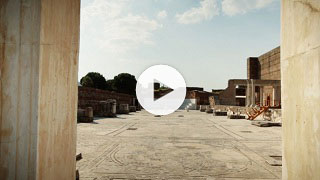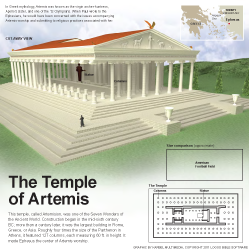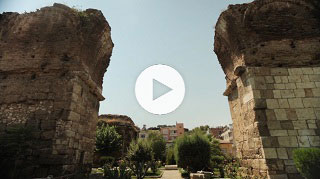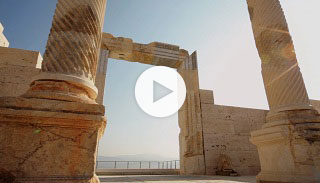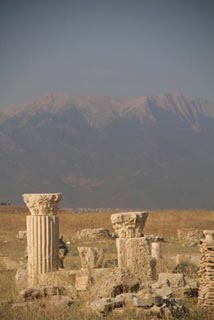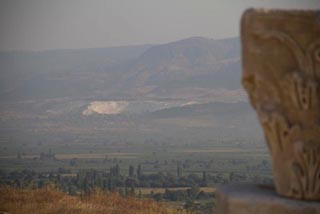3:1 Sardis A military stronghold in antiquity, Sardis had a reputation for being impregnable, though in fact it had been conquered twice in its history. Archaeologists have uncovered a massive temple there dedicated to Artemis.
had a reputation for being impregnable, though in fact it had been conquered twice in its history. Archaeologists have uncovered a massive temple there dedicated to Artemis.
 Messages to the Seven Churches of Revelation Table
Messages to the Seven Churches of Revelation Table
the one The phrases identifying the glorified Christ here reflect Rev 1:4, 16, 20.
you are dead Although they appear alive, they are spiritually dead. This church receives the harshest censure among the seven.
3:2 Be on the alert Through a series of imperatives, Christ calls this church to repentance.
about to die Because the believers in Sardis were complacent and lacked spiritual vigilance, they were close to death.
3:4 who have not defiled their clothing Christ offers encouragement to those few in Sardis who had not compromised with the surrounding culture. The use of clothing imagery may allude to Sardis’ prominent garment industry.
they will walk with me in white This is language of purity. It also symbolizes victory: Citizens would wear white clothing in a Roman triumphal procession.
3:5 the book of life The record of those who will inherit eternal life (20:12; Exod 32:32–34; Dan 12:1). Eternal life is given to believers in Jesus (John 3:16–17).
3:7 Philadelphia Like the church in Smyrna, the Philadelphian church receives praise from the Lord. The city was known for its commercial and agricultural importance, particularly its grape crops. Its patron deity was Dionysus, god of wine. The city received permission to build a provincial temple, earning it the name Neocoros (meaning “keeper of the temple”).
church receives praise from the Lord. The city was known for its commercial and agricultural importance, particularly its grape crops. Its patron deity was Dionysus, god of wine. The city received permission to build a provincial temple, earning it the name Neocoros (meaning “keeper of the temple”).
 Messages to the Seven Churches of Revelation Table
Messages to the Seven Churches of Revelation Table
one who has the key of David Describes the right to rule (compare Isa 22:22).
the one who opens and no one can shut Indicates Christ’s authority to admit or exclude. In light of v. 8 and 3:12, this may refer to the new Jerusalem (ch. 21).
3:8 I know your works Christ’s common refrain throughout these letters (see 2:2, 19; 3:1, 15).
door that no one is able to shut May indicate that the believers in Philadelphia had been excommunicated from the local synagogue. The “synagogue of Satan” reference in the following verse, contrasted with the believer’s establishment as permanent fixtures in the temple of God in v. 12, supports this conclusion.
little strength The congregation was probably small and of little importance in the city, yet they remained faithful.
3:9 synagogue of Satan See 2:9 and note.
I will make them come and kneel The church would be vindicated before nonbelieving Jews in the city (compare Isa 60:14).
3:10 the hour of testing Refers to the outpouring of God’s wrath on the world (beginning in Rev 6:1). Believers will be spiritually protected from various demonic attacks and plagues (see 9:4; 11:1 and note), and those who persevere will obtain eternal life (see 14:12–16) and admittance to the new Jerusalem (see chs. 21–22).
3:11 I am coming quickly While Christ uses this phrase with some of the other churches to indicate judgment, here it refers to deliverance.
3:12 a pillar The temple was the dwelling place of God. Paul refers to believers, both individually and corporately, as the temple of God (1 Cor 3:16–17). The language here describes the believer’s permanent residence in the abode and presence of God.
I will write on him As a means of identification and belonging (compare Isa 62:2; Ezek 48:35). The rewards for endurance and perseverance throughout Revelation all point to an abiding presence and relationship with God and Christ (see Rev 21:3–5).
the new Jerusalem See 21:2.
3:14 Laodicea Located in the Lycus River valley not far from Colossae and Hierapolis, Laodicea was known for its banking, medical, and clothing industries.
was known for its banking, medical, and clothing industries.
 Messages to the Seven Churches of Revelation Table
Messages to the Seven Churches of Revelation Table
the originator of God’s creation The Greek word used here to describe Christ can mean “ruler” or “originator.” Compare John 1:1–5; Col 1:15–18.
3:15 you are neither cold nor hot This imagery may allude to the water system at Laodicea. The city had no water supply of its own; it had cold water piped in from Colossae or hot water piped in from the springs at Hierapolis. When the water arrived in the city, it had become lukewarm. Like the water, the church at Laodicea was neither refreshing (like cold water) nor healing (like hot spring water).
3:17 I am rich Thanks to its banking industry, Laodicea was a wealthy city. Like the city, the church there had convinced itself that it was self-sufficient—but was deceived about its true spiritual state.
3:18 gold refined by fire Describes true wealth, as opposed to the money the Laodiceans made from commercial pursuits. This is a metaphor for removing sin (e.g., Job 23:10; Prov 27:21).
eye salve The Laodicean medical school was known for producing eye salve. Christ prescribes His salve as the cure for spiritual blindness.
3:20 I stand at the door and knock Describes a request for a renewal of fellowship (e.g., Song 5:2). In their self-sufficiency, the church in Laodicea had locked Christ out. He wants them to repent and, ultimately, take part in the coming messianic banquet (Rev 19:9).
(Rev 19:9).
3:21 The one who conquers The one who endures in faith and following Christ. See note on 2:7.

|
About Faithlife Study BibleFaithlife Study Bible (FSB) is your guide to the ancient world of the Old and New Testaments, with study notes and articles that draw from a wide range of academic research. FSB helps you learn how to think about interpretation methods and issues so that you can gain a deeper understanding of the text. |
| Copyright |
Copyright 2012 Logos Bible Software. |
| Support Info | fsb |
 Loading…
Loading…

